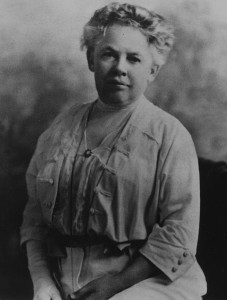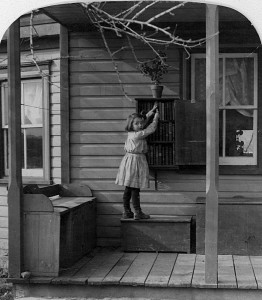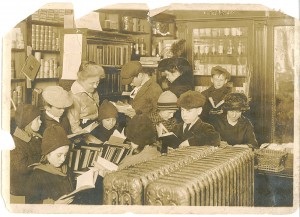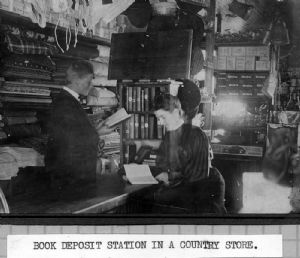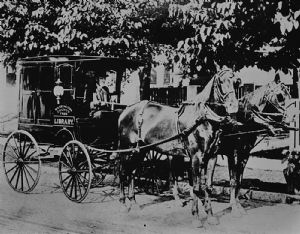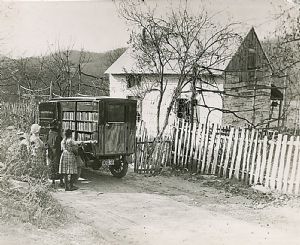A gold medal in the Librarian Olympics goes to Mary Titcomb. Born in Framingham NH in 1857, Mary Titcomb was an originator in Library and Information Science and a tireless and inspired advocate of library outreach. As the first librarian at the Washington Community Free Library in Maryland, Mary felt compelled to expand access to books to people in communities outside Washington County. She pioneered a system of outreach which sent boxes of books on a Library Wagon to 22 “deposit stations”. These stations would include general stores, post offices, barns, even front porches. The libraries would drop off requested books and readers would pick them up. The stations were located in different communities, so each reader would only have to travel to the nearest deposit station. By 1904, boxes with 30 volumes each were sent to 66 deposits, drastically increasing the number of people who had access to reading materials in the area.
But Miss Titcomb was not satisfied with the deposit system. As she wrote in The Story of the Washington County Free Library:
“Would not a Library Wagon, the outward and visible signs of the service for which the Library stood, do much more in cementing friendship”?
Thus the Bookmobile was born! Â
A literal wagon filled with books and drawn by two spindly nags named Dandy and Black Beauty clattered around the countryside delivering books house to house. The wagon was driven, and the books were distributed, by Joshua Thomas, the library’s janitor. Gold medal in the Janitor’s Olympics goes to Joshua Taylor!
It’s impossible to look at the photographs of books being hand delivered to poor children in ramshackle stores or in remote homes/shacks, and not be in awe of Mary Titcomb and of the all the heroic Librarians who carried her torch – always pictured looking so noble and magnificent, heroines of the highest order, omniscient in their requisite buns and specs. Said Mary:
“No better method has ever been devised for reaching the dweller in the country. The book goes to the man, not waiting for the man to come to the book. Psychologically too the wagon is the thing. As well try to resist the pack of a peddler from the Orient as the shelf full of books when the doors of the wagon are opened by Miss Chrissinger at one’s gateway”.
On pioneering the mode of transporting books to Library-less communities all over the country she wrote:
“Any account of this first Book Wagon work, the first in the United States would be incomplete without the statement that this method of rural library extension has been adopted in many states in the Union, and that new book wagons are being put in operation each year.” Indeed bookmobiles are now found as part of many library systems around the world, utilizing vans and buses, but also boats, camels and even donkeys. From the first “perambulating library” in Warrington, England in 1858 to the first 20th century book wagon in the United States in 1905, to the more modern book and media delivery systems, libraries are still taking their wares to an appreciative public”.
Mary Titcomb died in 1932 at the age of 75. in 1990 she was inducted into the Maryland’s Women’s Hall of Fame. It is impossible to know how many people’s lives were bettered and enriched by this one woman’s heroic devotion to providing them with access to books. I know mine has been. Although I have always had access to books and libraries, the sight of the venerable Bookmobile chugging up the street was up there with the Good Humor truck. No matter how many books you had and no matter how many gallons ice cream was in your family’s freezer, You had to have those Scholastic Books the same way you needed that Toasted Almond or Chocolate Chip Candy Bar. What is known is that Mary Titcomb’s ingenuity spanned generations, as readers everywhere continue to benefit from her noble experiment back in 1905.

